- Home
- Donis Casey
The Wrong Girl Page 2
The Wrong Girl Read online
Page 2
“A slim but intriguing connection, Miss LaBelle…”
“Bianca!”
Alma Bolding, star of stage and screen, was standing in the door behind them. She had not appeared in a movie in years, but she was not one to hide herself from any adoring fans she might have left. It was not unusual to catch sight of her around Hollywood or Beverly Hills in her sporty convertible Bugatti, roaring down Hollywood Boulevard.
Oliver hardly recognized her. She looked terrible, wrapped in a yellow silk Chinoise dressing gown, a few strands of too-black hair coming loose from the twist on top of her head. She was pale and blousy, puffy dark circles under her eyes. He knew that she wasn’t that old in normal human terms—perhaps around forty—but in movie star years, she had reached the age when most actresses resorted to desperate measures to retain their youthful looks, started taking supporting roles as the heroine’s mother, became businesswomen, or killed themselves. Her shocking appearance made Oliver wonder how long it would be before she chose one or the other. Still, she was the great Alma Bolding in the flesh, motion picture queen for nearly twenty years, and Oliver couldn’t help but be awed. He stood up.
“Miss Bolding,” he said.
Alma straightened, lifting her chin to look down her aristocratic nose at him. “Who the crap are you, young man?”
Oliver had grown used to such language from women in Hollywood. “The name is Ted Oliver, Miss Bolding. I’m a private consultant who has been hired to find some information about a man named Graham Peyton.”
Alma’s eyes narrowed. “Peyton? Did that son of a bitch turn up again? I thought he skipped to Buenos Aires years ago. Why are you bothering Bianca about him?”
“You knew Graham Peyton?” Oliver had not expected this.
Alma swept into the room and flung herself into a chair next to a table sporting a gilt and ivory telephone. “Keep your lip zipped, Bianca,” she said, reaching for the receiver. “I’ll have Del over here in a jiffy.”
Bianca cast a glance at Oliver. “Don’t be so dramatic, Alma. I’ve already told Mr. Oliver that I’ve never heard of the man.”
“Well, I have. He was before your time, honey. Everybody in Hollywood knew about Peyton, and believe me, he wasn’t the kind of guy you’d hang around with.” Alma pointed an accusing finger at Oliver. “He’ll make up a story anyway, Bianca. They all make up stories. No matter what we say.”
“Now, Miss LaBelle—” Oliver attempted, but Bianca stopped him with a gesture.
“Perhaps she’s right, Mr. Oliver. It won’t matter that I can’t help you. I don’t know you, but I do know what this town is like.”
“I’m not going to sell some half-fabricated story to the Hollywood Examiner, Miss LaBelle.”
Alma snorted. “So you say, Mr. Detective. You can’t be in the motion picture business for as long as I have without learning that most people are scumbuckets who are only out for themselves. I doubt if your word is worth the paper it’s written on.”
“Perhaps you’d better go, Mr. Oliver,” Bianca said. “Fee, please show our guest out.” Oliver turned to see that the majordomo was already standing in the doorway, glowering at him in a most alarming fashion. He didn’t argue.
Oliver couldn’t blame the women for their attitude. The studios owned the newspapers and the police, and if an actor didn’t toe the line his studio set for him, he could find himself destroyed overnight. It was ten times worse for women. And here was Oliver, sniffing around Bianca LaBelle, Bianca Dangereuse herself, trying to find out if she knew anything about the death of a dealer in whatever shady enterprise was going; drugs, booze, money laundering, whores, and who knew what else.
“How long have you worked for Miss LaBelle?” Oliver asked as he followed Fee’s bulk down the marble hallway to the front door. Fee’s icy silence chilled the air.
* * *
Oliver returned to his apartment in Santa Monica. He hung his fedora on the hat rack beside the door and sat down at his desk. From everything he had discovered over the previous week, he surmised that Graham Peyton had been a royal son of a bitch. Perhaps there were mysteries best left unsolved.
People get forgotten in a hurry. Graham Peyton was a bootlegger, a bag man, and a frequent violator of the Mann Act, which forbade the transportation of underage girls across state borders for immoral purposes. The man who hired Oliver had indicated that when Peyton had disappeared without a trace, so had fifty thousand dollars and a leather-bound ledger. Oliver could understand why his shadowy client was looking for that much money and a missing ledger full of incriminating information. But why would anyone care if somebody murdered a character like Graham Peyton? There were plenty of other guys with no conscience who would be happy to do his job.
Oliver had just decided to think about supper instead of murder when his party line telephone jingled, two short rings and a long. It was for him.
It took him a moment to recognize Fee’s low rasp on the other end. “Mr. Oliver, Miss LaBelle would like to see you. Would you come to the estate for luncheon tomorrow?”
But there is more to this story than first meets the eye.
The walk from Bianca’s house to her stables had been long and twisty, down bridle paths encircling the estate and through a small citrus orchard. Fee conducted Oliver down a gravel path that led around the swimming pool, through a neat vegetable garden, more scattered fruit trees, mostly apple this time, to the small paddock at the back of the property, backing up to the rocky side of the mountain. It was dark inside the stable after the sun-drenched hike, and it took a moment for Oliver’s eyes to adjust.
Bianca was standing at a stall halfway down the central aisle. She was dressed for riding, in high lace-up boots and jodhpurs, an embroidered white shirt, her hair once again covered with a scarf, yellow flowered silk. This was the first time he had seen her standing up, and he was surprised to note that she was easily as tall as he was. She was communing with a blaze-faced roan whose massive head was hanging over the door of his stall. Bianca had pressed her forehead to the horse’s and was murmuring to him, so softly that Oliver couldn’t hear what she was saying. He suspected it wasn’t anything that he would understand, anyway. She didn’t move when they came in, though her green eyes shifted in his direction. Oliver nearly collided with Fee when she/he stopped walking. He couldn’t get around the majordomo’s bulk, so had no choice but to stand and wait until Bianca deigned to acknowledge them.
Finally she sighed into the horse’s nostrils, and the horse sighed back. She turned to face Oliver. “Hello, Oliver. Thank you for interrupting your investigation long enough to come out on such a lovely day. Have you turned up any more skeletons in the rocks since yesterday?”
A pang of annoyance hit him. “You wanted to see me, Miss LaBelle.”
Her amused expression did not dim. She straightened, suddenly businesslike. “Fee, would you please ask Norah to set out our luncheon in the library? We will be inside shortly.”
Oliver had to squash himself up next to the slats of one of the stalls in order to let Fee pass. He was just about to say that he was not here for damn tea and cakes, but Bianca forestalled him.
“Do you ride, Detective?”
“What? No. I…”
“That’s too bad. I grew up around horses, you know. When I was a kid I thought I didn’t want anything more than to get away from the smell of horse sweat, but nowadays nothing soothes my soul like a leisurely ride. Horses ask very little of you. Oh, well. There’s nothing for it, I suppose. Let’s go inside to talk.”
She led him briskly up the path to the house (a much shorter route than Fee had led him, Oliver noticed), and they entered through the sunroom where he had first spoken to her. He followed her down a hall with a black tiled floor so shiny that he briefly wondered if the modesty of women in skirts was compromised when they walked over them. The decor of the house was surprisingly plain, the walls
painted white and mostly bare except for black, white, and gold fan-shaped sconces covering the wall lighting. They passed through a cavernous, white-carpeted living room with sleek, metallic furnishings and into a sizable library. There was some interesting art on the walls in the living room, rather exotic, Oliver thought, but Bianca was moving fast and he didn’t have time to examine the objects and still keep up with his hostess.
The library was different from the rest of the house, at least what he had seen of it. This room was full of wood and had a simple, almost Japanese look to it. Three walls were lined with bookshelves and the fourth with floor-to-ceiling windows. A semicircular bench in the center of the room curled around a round mahogany table. A small secretary’s desk was tucked into one corner. Bianca settled herself into a comfortable-looking white leather chair, and gestured for Oliver to take a seat in its twin, next to her. The funny little dog that Oliver had met on his first trip trotted into the room, following a maid who was holding a tray of sandwiches. The pooch did his usual sniff and warning “whuff” before taking up his vigil at Bianca’s feet.
“That’s some dog. What kind of dog is that?”
“Thanks. I think he’s some kind of dog, too. We’ve decided he’s part rat and part drain hair. But I love him. I call him Jack Dempsey.” Jack Dempsey looked up at the sound of his name and Bianca scratched his chin. “We adopted each other a few years ago.” She gestured toward the tray the maid had put on the side table. “Have a sandwich.”
Oliver picked one out, had a bite, then got to the point. “Do you have some information for me, Miss LaBelle?”
“Have you learned anything more about what happened to Peyton?”
Oliver shifted in his chair. He was used to hearing people dance around his questions. He didn’t like it. “Since we spoke yesterday? I’m in the early stages of my investigation. The police are still maintaining that his death was an accident, that he must have fallen from the cliff. And maybe he did.”
She sat in silence for a long minute before her eyes wandered to the bookshelf behind his chair. “Do you like to read, Mr. Oliver?”
“Miss LaBelle, I…”
“I love this room. If heaven is really a place where I would want to go, it’ll look like this. If I get a choice, I’ll spend eternity riding horses and reading books.” Her gaze shifted back to his face, her eyes green ice that made him catch his breath. “Tell me about yourself, Oliver.”
“Well, Miss LaBelle, there’s not much to tell. Besides, if I’m going to give you my autobiography, I think it’s only fair that you return the favor.”
She favored him with the enigmatic smile for which she was famous—small, quirky, knowing.
“My past is hardly classified information, Mr. Detective. Anyone who really wanted to know the truth about me only had to look. Most people don’t want to know.”
“I disagree. Everyone wants to know the truth about the beautiful French princess with the broken heart.”
Her voice was tinged with irony. “I can assure you that no one in Southern California is still the person she was born as. The publicity director at United Features was the one who created the heartbroken French aristocrat.”
“So you’re not an aristocrat.”
“Hardly. Not from France, either.”
“Are you heartbroken?”
“Not at all. In fact, thus far my life has turned out remarkably well. I’m still young, of course, so who knows what the future holds? But that’s true for all of us, so I don’t worry about it. Now, I’ve told you about my life. It’s your turn to tell me about yours.”
Oliver almost pointed out that aside from admitting that she was not really a French aristocrat, Bianca had not told him anything. He changed his tactic. Perhaps if he gave her reason to trust him, she could be coaxed. “I haven’t been in California very long. I moved down here from Oregon, thinking I was going to be the next John Gilbert. I wasn’t as lucky as you, movie star-wise.”
“How do you like California?”
I don’t, he thought. “Miss LaBelle, why did you want to speak to me? Surely not just to exchange life stories.”
“I wanted to ask you if you will keep me informed about the progress of your investigation. I will of course pay you for your time.”
“I can’t do that. I owe my client my discretion.”
One sculpted eyebrow inched upward. “Well, that’s unusual. Could it be that you are the only ethical man in Hollywood?”
“I wouldn’t go that far. But I do maintain certain standards for myself, if no one else. Why do you want to know?”
“Is your client K.D. Dix?”
Oliver’s eyes widened, but he said nothing. How did she know about K.D. Dix?
Bianca laughed. “I’ll take that as a ‘yes’. But it doesn’t matter, Mr. Oliver. I don’t need to know who your client is. If you do decide to keep me in the loop, I’d appreciate it if you wouldn’t tell your client of my interest. I guarantee that it has nothing to do with Dix’s operation.”
“I understand your concern, Miss LaBelle. But why have you suddenly developed an interest in the investigation? I thought you were afraid that I would make up some celebrity gossip about you to sell to Photoplay for a bundle. Or blackmail you into paying for my silence.”
“I’ve done a little investigation of my own since you were here yesterday, Oliver. Some of my friends have told me what you’ve done for them, and discreetly, too. And Mr. Laemmle vouches for you, which goes a long way in my book.”
Oliver didn’t say it, but it did strike him as ironic that it was Laemmle who had recommended his services to K.D. Dix in the first place. His skepticism must have shown on his face, because Bianca said, “Don’t say anything bad about Carl Laemmle, not in my presence, Mr. Oliver.”
“I was just thinking that it must be Laemmle who told you about Dix. No, never mind. Let’s just agree to trust each other on this one.” The Laemmle connection didn’t surprise Oliver that much. Carl Laemmle had founded Universal Studios in a deserted area of the San Fernando Valley more than a decade earlier, and was the man who had first signed Mary Pickford. “Uncle Carl” liked betting on the ponies and playing high-stakes poker, but unlike many studio moguls, he was not a lecher. In fact, he was known for hiring women to write and direct his pictures. He had a reputation for liking smart women. It was no wonder he liked Bianca.
“All right, Miss LaBelle. I’ll try to keep you informed.”
“I appreciate it.” She stood, and Oliver stood too. He was aware that Fee had entered the room and was standing behind him. His sandwich was half-finished, but the audience was over.
Santa Monica, California
One week earlier...
Ted Oliver was a good-looking man. He knew it, but he didn’t put much stock in the fact. Southern California was chockablock with good-looking men. Most of them with the character of a weasel, and in certain cases that comparison was insulting to weasels everywhere. He had originally come to California to get into the moving pictures, but it didn’t take long for him to realize that he could make a much better living as a private agent. Oliver had carved out a nice business for himself by doing favors for the studios, mostly by tracking down and paying off blackmailers who threatened to release incriminating evidence about the indiscretions of high-earning movie stars. On the side, he located runaways and deadbeat husbands, spent a lot of time sitting outside of hotels with a Brownie camera, waiting for his client’s spouse to walk out the front door, arm in arm with his or her latest dalliance.
He met most of his clients at their homes, or in Santa Monica at his usual table in Bay Cities Italian Deli on the corner of Broadway and Lincoln. On the rare occasion that a potential client preferred a neutral location, or more privacy than a public dining room could afford, Tony DiTomasi let Oliver use his office at the back of the restaurant. Oliver was a good customer, so as long as it d
idn’t discommode anyone, Tony didn’t charge him for the privilege. If the client objected to the aroma of garlic and oregano, then Oliver didn’t particularly want to do business with him, anyway.
He had been at the private agent business long enough to have formed a less than favorable opinion of his fellow man. His fellow woman didn’t win any prizes in his estimation, either.
On this day, a man by the name of Ruhl had arranged a meeting with him at Bay Cities. When Ruhl showed up at two o’clock on the dot, Oliver was already ensconced behind Tony’s desk, which was big enough to be intimidating even if it was located in a closet-sized room lined with shelves of tomato sauce and olive oil.
Oliver was surprised when Tony ushered the man in. Usually Tony couldn’t be bothered to do more for Oliver’s clients than wave his hand in the general direction of the office.
But when Oliver got a gander at the guy, his eyebrows inched upward.
The man was seventy if he was a day. He was dressed in a homburg hat, a cutaway coat, and a pair of skimpy trousers of a style that hadn’t been popular for thirty years. His outfit was expensive, though, and new. The man had money enough to have his clothes tailored and prestige enough not to give a rat’s ass about fashion. Oliver and Tony exchanged a pregnant glance over the man’s head before Tony shut the door and left them alone.
Oliver stood up long enough to shake the man’s hand and invite him to make himself comfortable in the upholstered chair in front of the desk. Once back in place, Oliver looked the man over while the man pointedly did the same to him. Eventually Oliver decided that somebody ought to start the ball rolling.
“What can I do for you, Mr. Ruhl?”
The man’s eyes were the color and, it seemed, the consistency of steel. “I understand from my friend, Mr. Laemmle, that you are good at what you do, and discreet.”

 The Wrong Girl
The Wrong Girl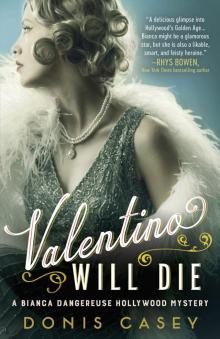 Valentino Will Die
Valentino Will Die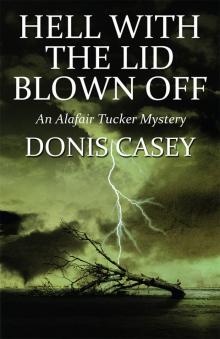 Hell With the Lid Blown Off
Hell With the Lid Blown Off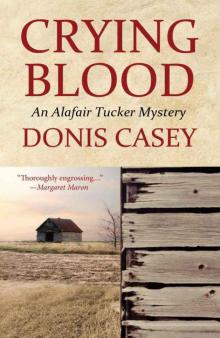 Crying Blood - An Alafair Tucker Mystery
Crying Blood - An Alafair Tucker Mystery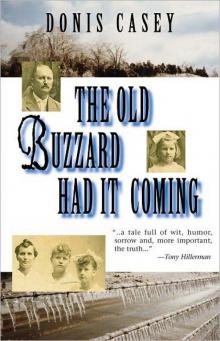 The Old Buzzard Had It Coming: An Alafair Tucker Mystery
The Old Buzzard Had It Coming: An Alafair Tucker Mystery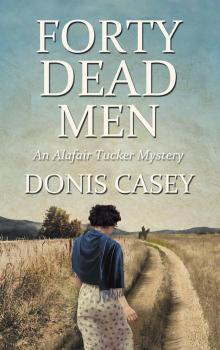 Forty Dead Men
Forty Dead Men All Men Fear Me
All Men Fear Me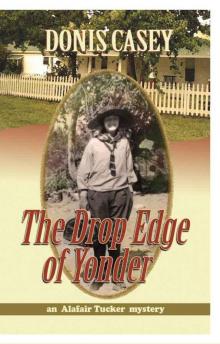 The Drop Edge of Yonder - An Alafair Tucker Mystery
The Drop Edge of Yonder - An Alafair Tucker Mystery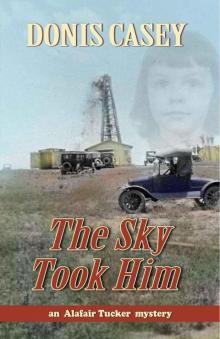 The Sky Took Him - An Alafair Tucker Mystery
The Sky Took Him - An Alafair Tucker Mystery Hornswoggled - An Alafair Tucker Mystery
Hornswoggled - An Alafair Tucker Mystery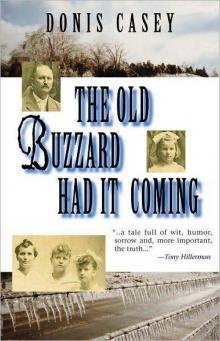 The Old Buzzard Had It Coming
The Old Buzzard Had It Coming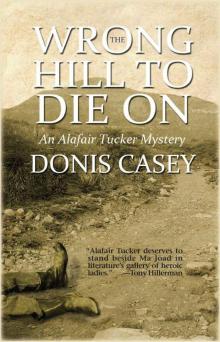 The Wrong Hill to Die On: An Alafair Tucker Mystery #6 (Alafair Tucker Mysteries)
The Wrong Hill to Die On: An Alafair Tucker Mystery #6 (Alafair Tucker Mysteries)